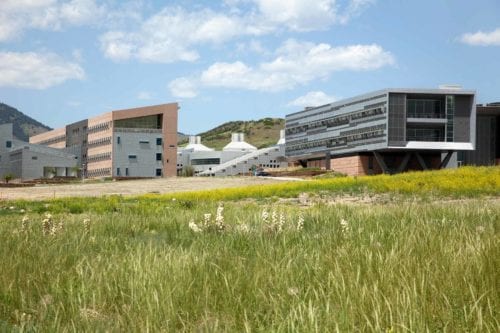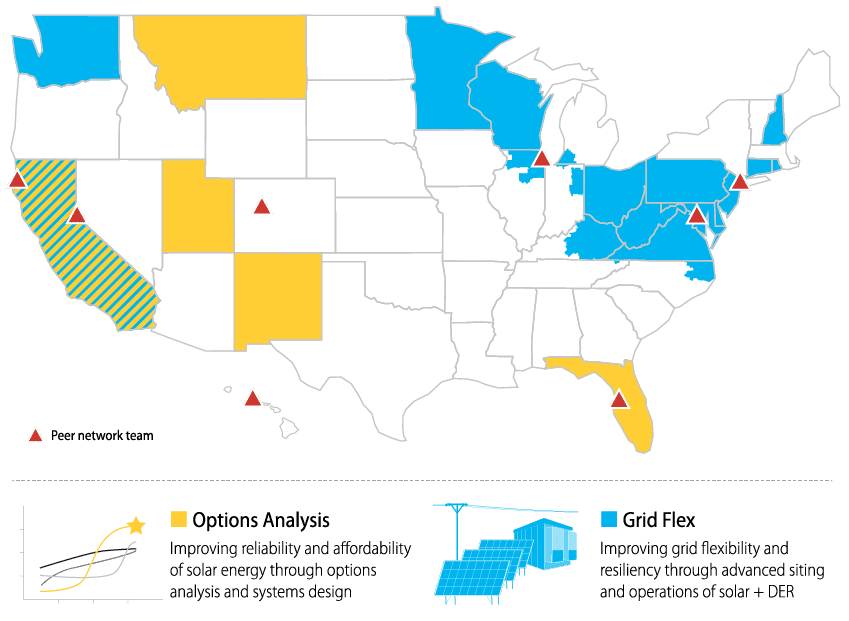
Rocky Mountain Institute and National Renewable Energy Laboratory Hosting Third Working Session for Solar Energy Innovation Network
This week, Rocky Mountain Institute (RMI) is partnering with the US Department of Energy’s National Renewable Energy Laboratory (NREL) to host nine teams from across the country for the third working session of the Solar Energy Innovation Network. The Solar Energy Innovation Network, which is administered by NREL and supported by the US Department of Energy (DOE) Solar Energy Technologies Office, utilizes an innovative program design that assembles diverse teams of stakeholders to research solutions to real-world challenges associated with solar energy adoption. The first round is focused on developing and demonstrating new ways for solar energy to improve the affordability, reliability, and resiliency of the nation’s electric grid.
Each of the nine teams participating in the first round brings together a range of stakeholders—including utilities, state and local governments, nonprofits, system operators, and other companies—to ensure that the solutions they develop benefit from diverse perspectives and community buy-in. These teams are organized into two cohorts based on shared goals and challenges.
The Improving Reliability and Affordability of Renewable Energy through Options Analysis and Systems Design (or “Options Analysis”) Cohort is focused on identifying the grid impacts and costs anticipated with various penetration levels of solar and other distributed energy resources (DERs). The project teams selected for the Options Analysis Cohort are:
- Orlando: Renewable and Resilient – led by the City of Orlando
Analysis of Distributed Solar Potential in San Diego – led by the City of San Diego - Montana Solar-Powered Community Transportation Initiative – led by the Montana Renewable Energy Association
- Renewable Electricity Impacts and Solutions in Utah – led by Utah Clean Energy
- Resilient Renewable Energy Roadmap for Rural Electric Cooperatives – led by Kit Carson Electric Cooperative
The Improving Grid Flexibility and Resiliency through Advanced Siting and Operations of Solar + DER (or “Grid Flex”) Cohort is focused on quantifying the value of combining solar and other DERs, such as storage, for grid flexibility, reliability, and resiliency. The project teams selected for the Grid Flex Cohort are:
- Solar PV for Advanced System Resilience and Restoration – led by PJM Interconnection and the National Association of Regulatory Utility Commissioners (NARUC)
- Multistate Initiative to Develop Solar in Locations that Provide Benefits to the Grid – led by Clean Energy States Alliance (CESA)
- Technological and Market Deployment Synergies between EVs [electric vehicles] and Solar DG [distributed generation] Using EV Charging to Add Value to Distributed Solar – led by Great Plains Institute
- Exploring Advanced Rate Structures to Expedite Solar + DER Deployment – led by the Center for Climate Protection
As the US electric grid increases in complexity, new problem-solving approaches are needed
The United States electric grid is rapidly developing as more advanced energy technologies—such as photovoltaic (PV) systems, battery storage, and electric vehicles—become more commonplace. Stakeholders are facing new challenges and opportunities, both technical and nontechnical, as these distributed energy resources drive grid modernization.
By pairing teams of stakeholders from across the United States that are implementing pilot projects with analytical support from a broad set of technical experts, the Innovation Network develops novel applications of solar energy and other distributed energy technologies. Rigorous demonstration and validation of these applications in real-world laboratories makes them ready for widespread adoption. In addition, RMI is supporting Innovation Network teams by designing and facilitating interactive meetings where they can accelerate their projects, leveraging expertise from the national laboratories, expert nonprofits, and peer projects in diverse jurisdictions around the country.
To inform meeting design, RMI is drawing from its experience hosting the Electricity Innovation Lab (e-Lab), a unique multiyear collaboration of leading industry actors to develop, implement, and spread new solutions for a cleaner and more resilient electricity system. e-Lab was built on the fact that as clean technology costs decline, the barriers to economic deployment of distributed energy resources are increasingly institutional or systemic rather than techno-economic. Overcoming these barriers will require multiple stakeholders, new ways of working together, and support for experimentation and rapid learning.
At the working session at NREL’s Golden, Colorado, campus, teams will see the results of modeling and other analysis being carried out within the Innovation Network, connect with other teams to share knowledge and lessons learned, and engage in facilitated problem-solving sessions to pull it all together and identify the best paths forward. The range of stakeholders represented both within and across teams is intended to encompass many perspectives, leading to more robust and replicable solutions.
Insights and results from the working session and the program more generally will be shared at a conference in the summer of 2019, through NREL publications, and on the Innovation Network website.
NREL is operating the Solar Energy Innovation Network with funding from the US Department of Energy Solar Energy Technologies Office. NREL pursues fundamental research and development of renewable energy and energy efficiency technologies to transform the way we use energy.
